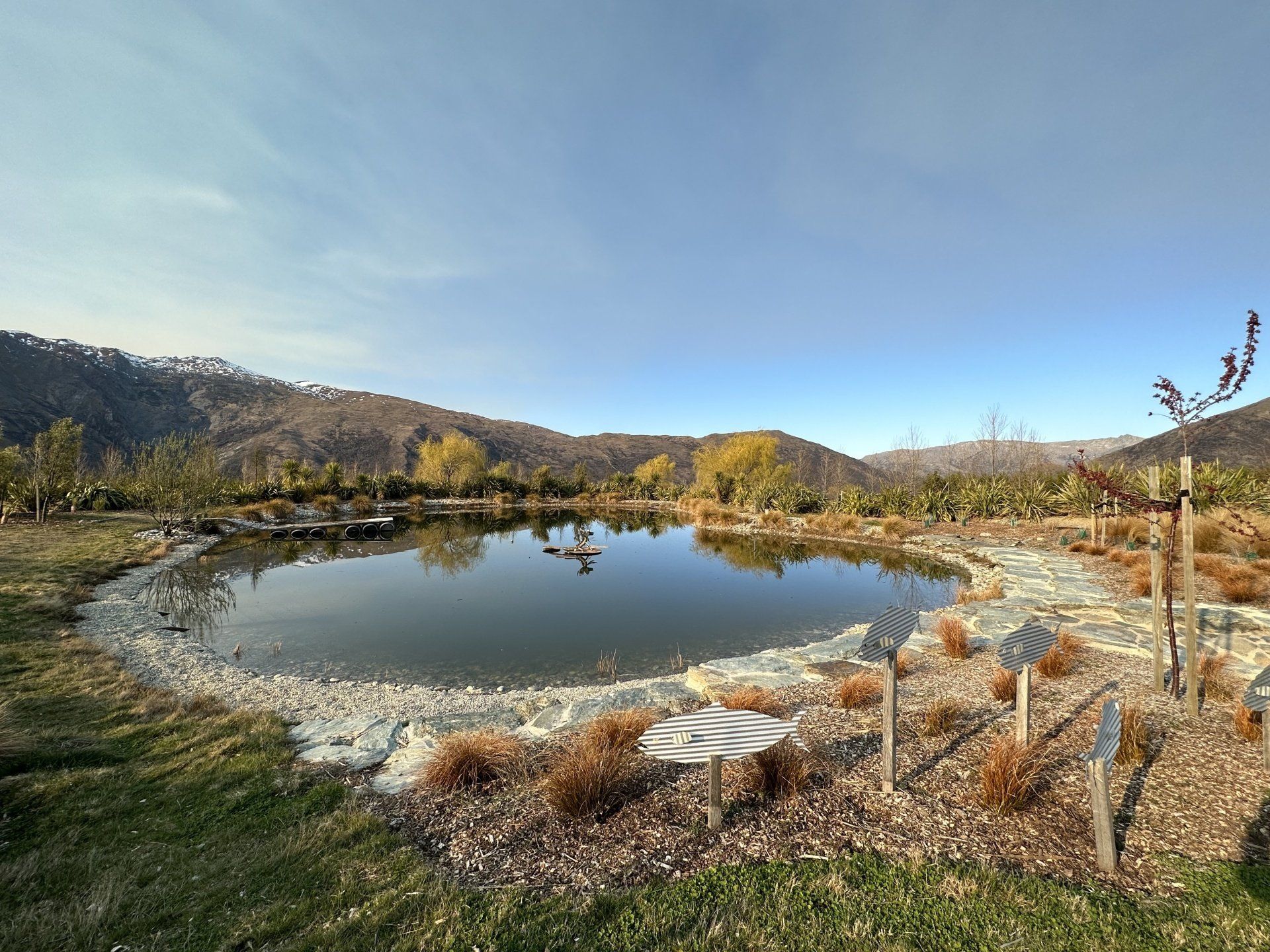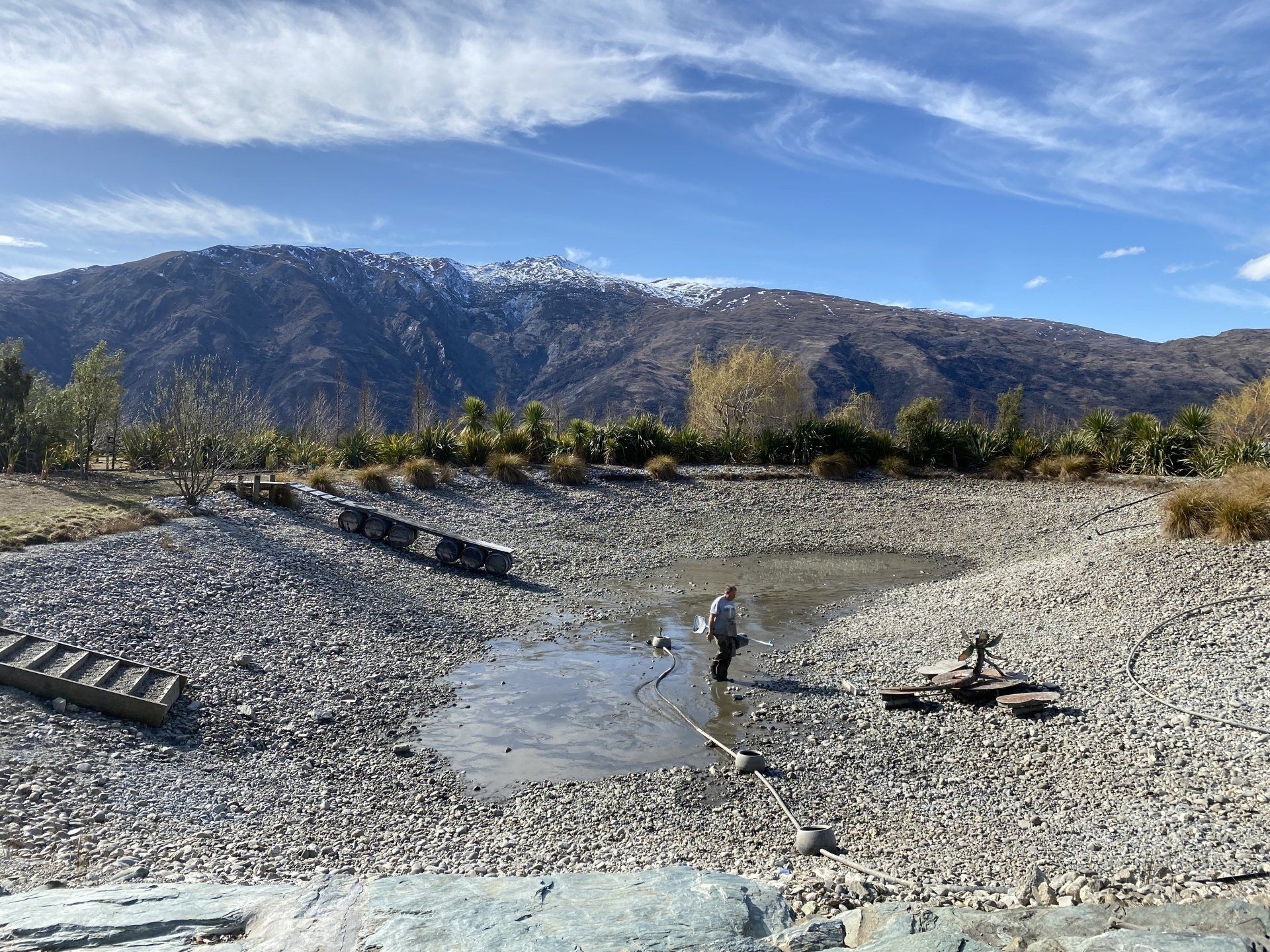When Things Don’t Work


When things don’t work properly you want to fix them, right? The pictures above are illustrate one of those situations where a former home owner leaves you something that doesn’t work properly. Greg, who sold us this property, dug out a big hole in the paddock, put a clay liner in with gravel over the top and turned it into a pond. A pond is a huge asset in a place where summer is hot and dry – it’s great for swimming (and fire fighting). However, Greg didn’t think too hard about pond maintenance issues and nor did we when we bought the property. We just thought the pond looked nice, and big.
It turns out that ponds fed from natural water sources fill up with silt. This is the second time we have fully emptied the pond to try and remove the silt. On the previous occasion we got 25 sucker truck loads of silt removed; that was expensive. Now we are doing more regular maintenance. This time we removed about 120 twenty litre buckets of silt by hand after Chris washed the mud down the sides to the bottom; that was hard work. I pointed out to Chris that when I carried a bucket of mud it was about half my weight!
The silt is a nuisance, but the greater ‘not working’ issue in our pond is the pretty weed Greg put in it. When we arrived we admired the little white and yellow flowers and had no idea that broadleaf watermilfoil could be called an ‘aquatic nightmare’. The watermilfoil spread and spread and spread. By the time we engaged in the first big clean-up, we had already removed tens of cubic metres of plant mass. After a hugely intensive weeding exercise on our first pond emptying, we are now down to select patches of weed rooted deeply in the silt (silt+weed=problem).
Lots of people I tell about the weed problem helpfully try and come up with solutions. Believe me, I have considered all options (fish to eat it, poison to kill it, burning to kill off the roots) and none of them eradicate a plant that easily regrows from a tiny piece of root or shoot in an aquatic environment. All we are left with is management – that’s the way of things with highly invasive and successful species. No permanent fix for this problem.
But pond weed wasn’t actually what I wanted to write about, it snuck in there because the pond was looking so pretty when it refilled. What I wanted to write about was the brokenness of the courier system. A short synopsis of my recent courier experience is:
- Package wasn’t delivered and card was left because we weren’t home. Except we were home and no card was left.
- Apple says talk to DHL the couriers. DHL says talk to Apple as the seller. Several times around the block phoning!
- Apple and DHL says that the package had to be signed for, that’s why it wasn’t delivered. I say, please deliver without signature. A few more phone calls.
- Apple and DHL say the package is now with the NZ Post Rural Delivery system – not their problem. But I don’t have a tracking number for NZ Post. Several more times around the Apple-DHL block to finally be sent a tracking number.
- NZ Post says they tried to deliver the package and where is my card? Back to the beginning…NZ Post say they will redeliver the package and will put it in our mail box. They say the courier will never ring us to get through the gate to come to the house because they only have personal cell phones and don’t want to pay the cost of phoning.
- An email comes saying the package will be sent to a new address. But I didn’t change the address!
- Finally, the package returns to the depot and I can collect it. Phew. I have my parcel.
Another recent courier experience was our package left on the corner of the State Highway and Coal Pit Road, 1.5 kilometres downhill. Luckily, a kind woman thought that was a strange place for a courier package and found my phone number on the package and rang me. Parcels have also been left sitting on the corner of our driveway and Coal Pit Road, 200m from any house.
The courier systems definitely are not working well and I would like them fixed. One could blame the drivers, but I don’t think that’s really where we should be headed. The conclusion I have come to is that courier systems are most likely too cheap because we are not paying the drivers enough for them to reliably deliver parcels. I reckon that first delivery wasn’t a real one – the driver looked at how far away we are from the main road and decided this was a job they could do without. Thus no card. And no driver trying to redeliver the parcel. And no driver ringing us because a call would cost them.
There’s been quite a lot of investigation of NZ courier services, finding that many courier drivers earn below minimum wage for the hours worked. They are mostly on contract, have to lease their vehicles, pay the running costs including fuel, pay for their own communications and often work 80 hour weeks to keep their heads above water. This could make one feel guilty…you buy something on line because it’s so much more convenient than going to a store and it costs $7 to ship it (usually with a $5 add on for us with rural delivery). $7 to ship something which could be from a location far removed in New Zealand. How much can a driver could be paid for delivery. A couple of dollars?
The ‘cheap’ problem feels symbolic of the greater world problem of hidden subsidies of which these are just a few:
- I can get a parcel delivered cheaply because someone else is struggling to make a living delivering it.
- I can buy cheap clothing because someone overseas is sewing for slave wages in a factory.
- I can consume cheap dairy products because no one is charging milk producers the cost of their pollution of the environment.
- I can fly overseas cheaply because governments are hugely subsidising the cost of aviation fuel through tax exemptions (why this happens I still haven’t really figured out…because governments don’t want airlines to collapse?).
If we priced in the real costs of goods/services in the first world, either they would be too expensive for us to afford, or organisations would go broke delivering them. Hmmm…that’s sobering.






